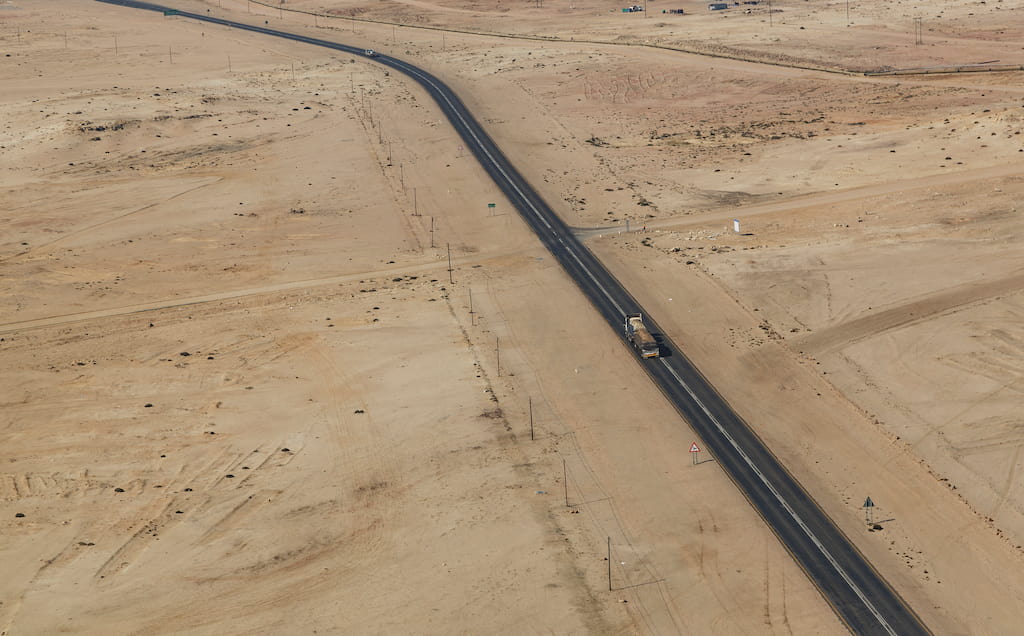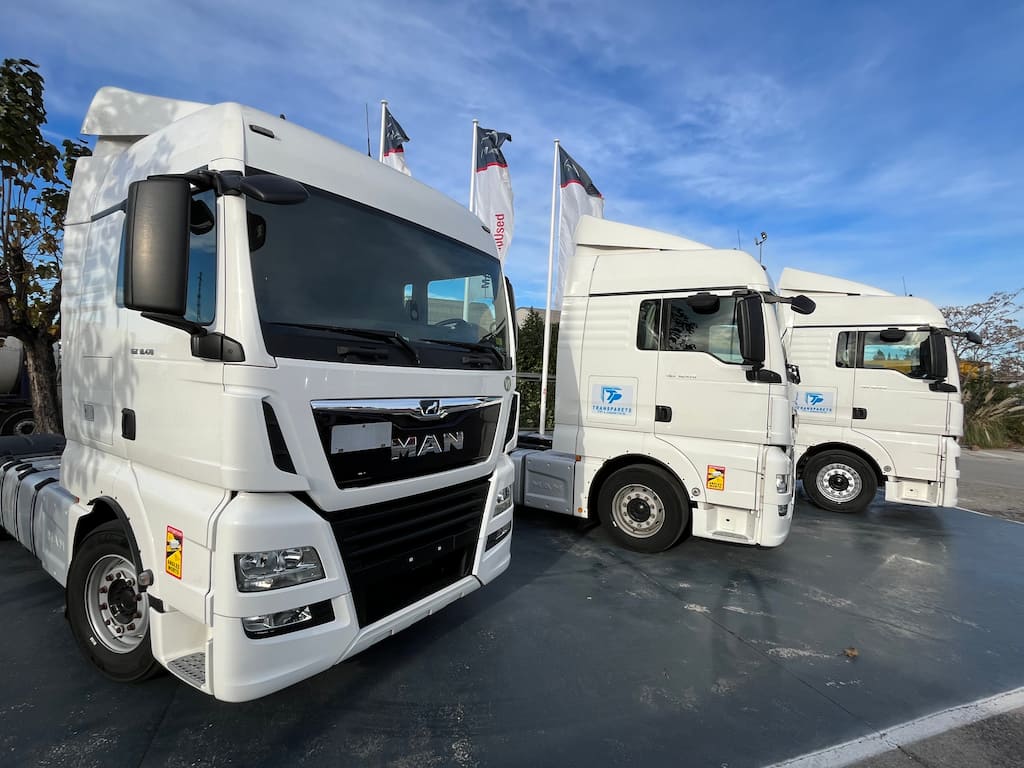
Tabla de contenidos
ToggleTodo lo que necesitas saber sobre el transporte de mercancías por carretera
Hoy vamos a sumergirnos en el fascinante mundo del transporte de mercancías por carretera. ¿Listo para descubrir cómo este sector juega un papel fundamental en nuestras vidas y en la economía actual?
Cuando hablamos de transporte de mercancías por carretera, nos referimos a la movilización de bienes y productos a través de camiones y vehículos similares. Es una parte esencial de nuestras operaciones comerciales y de nuestra vida diaria. Desde la entrega de productos en tu tienda favorita hasta el suministro de materias primas a las fábricas, el transporte por carretera mantiene todo en movimiento.
En este artículo, exploraremos en profundidad el transporte de mercancías por carretera, desde sus ventajas y desafíos hasta las últimas tecnologías utilizadas en el sector. ¿Estás emocionado? ¡Entonces empecemos! 👇
Ventajas del transporte de mercancías por carretera:

El transporte de mercancías por carretera presenta una serie de ventajas que lo convierten en una opción atractiva para empresas y consumidores. A continuación, exploraremos en detalle estas ventajas clave:
- Flexibilidad:
Una de las principales ventajas del transporte por carretera es su flexibilidad. Los camiones pueden llegar a prácticamente cualquier lugar donde haya carretera, lo que permite una entrega directa y rápida de mercancías. Esta flexibilidad es especialmente valiosa para empresas que operan en áreas remotas o que requieren entregas puerta a puerta.
- Accesibilidad a áreas remotas:
A diferencia de otros modos de transporte, como el ferrocarril o el transporte marítimo, el transporte por carretera ofrece una mayor accesibilidad a áreas remotas y rurales. Los camiones pueden circular por carreteras secundarias y caminos estrechos que otros vehículos no pueden alcanzar, lo que garantiza que las mercancías puedan llegar a su destino final, independientemente de lo remoto que sea el lugar.
- Capacidad para transportar variedad de mercancías:
Los camiones tienen la capacidad de transportar una amplia variedad de mercancías, desde productos perecederos hasta maquinaria pesada. Esta versatilidad permite a las empresas adaptar el tipo de vehículo y el método de embalaje según las necesidades específicas de cada carga, lo que garantiza un transporte seguro y eficiente.
Ejemplos y casos de uso:
Imagina una empresa de distribución de alimentos que necesita entregar productos frescos a supermercados en áreas urbanas y rurales. Gracias a la flexibilidad del transporte por carretera, los camiones pueden llegar directamente a cada ubicación, garantizando que los productos lleguen frescos y en óptimas condiciones.
Otro ejemplo sería una empresa de construcción que necesita transportar maquinaria pesada a un sitio de trabajo remoto. Los camiones con capacidad de carga pesada pueden acceder a terrenos difíciles y entregar la maquinaria justo donde se necesita, facilitando el progreso de la construcción.
Desafíos y Consideraciones:

El transporte de mercancías por carretera, a pesar de sus numerosas ventajas, también se enfrenta una serie de desafíos que pueden impactar en la eficiencia y rentabilidad de las operaciones. Algunos de los desafíos más comunes y estrategias para abordarlos:
- Congestionamiento del tráfico:
Uno de los mayores desafíos para las empresas de transporte por carretera es la congestión del tráfico. Las horas pico y las zonas urbanas densamente pobladas pueden provocar retrasos en las entregas y aumentar los costos operativos. Para abordar este desafío, las empresas pueden utilizar tecnologías de gestión de tráfico en tiempo real para identificar rutas alternativas y evitar áreas congestionadas. Además, la planificación cuidadosa de las rutas y horarios de entrega puede ayudar a minimizar el impacto del tráfico en las operaciones.
2. Altos costos operativos:
El alto costo de los combustibles, mantenimiento de vehículos y mano de obra puede representar un desafío significativo para las empresas de transporte por carretera. Para mitigar estos costos, es importante implementar prácticas de gestión eficientes, como el mantenimiento preventivo de vehículos, la optimización de rutas y la inversión en tecnologías de ahorro de combustible. Además, la negociación de tarifas competitivas con proveedores y la búsqueda de eficiencias en la cadena de suministro pueden ayudar a reducir los costos.
3. Regulaciones gubernamentales:
Las regulaciones gubernamentales, como los límites de velocidad, los períodos de descanso obligatorios para los conductores y los requisitos de seguridad, pueden imponer restricciones adicionales a las operaciones de transporte por carretera. Es fundamental que las empresas estén al tanto de estas regulaciones y cumplan con ellas para evitar sanciones y multas. Además, mantenerse informado sobre los cambios en la legislación y adaptar las operaciones en consecuencia puede ayudar a garantizar el cumplimiento continuo.
Estrategias y tácticas para abordar estos desafíos:
- Implementar tecnologías de gestión de tráfico en tiempo real para identificar rutas alternativas y evitar áreas congestionadas.
- Mantenimiento preventivo regular de vehículos para reducir costos de reparación y aumentar la eficiencia operativa.
- Optimización continua de rutas y horarios de entrega para minimizar el impacto del tráfico en las operaciones.
- Negociación de tarifas competitivas con proveedores y búsqueda de eficiencias en la cadena de suministro para reducir costos operativos.
- Mantenerse al tanto de las regulaciones gubernamentales y cumplir con ellas para evitar sanciones y multas.
Enfrentar estos desafíos requiere un enfoque proactivo y estratégico por parte de las empresas de transporte por carretera. Al implementar estas estrategias y tácticas, las empresas pueden optimizar sus operaciones y garantizar el éxito a largo plazo.
Tecnología en el transporte de mercancías por carretera:

La tecnología ha transformado radicalmente la industria del transporte de mercancías por carretera, proporcionando herramientas innovadoras que mejoran la eficiencia, la seguridad y la visibilidad de las operaciones.
Exploremos algunas de las tecnologías más recientes utilizadas en este sector y cómo están impactando positivamente en la industria:
- Sistemas de seguimiento GPS:
Los sistemas de seguimiento GPS permiten a las empresas monitorear en tiempo real la ubicación y el movimiento de sus vehículos en la carretera. Esto proporciona una visibilidad completa de la flota y permite una planificación más eficiente de rutas y horarios de entrega. Además, los sistemas de seguimiento GPS pueden ayudar a mejorar la seguridad al alertar a los conductores y a la empresa sobre condiciones peligrosas en la carretera, como accidentes o congestión del tráfico.
- Telemática:
La telemática combina tecnologías de telecomunicaciones e informática para recopilar y transmitir datos desde los vehículos en la carretera. Esto obtiene información sobre la velocidad, el consumo de combustible, el rendimiento del motor y más. Los sistemas de telemática proporcionan a las empresas una visión detallada del rendimiento de sus vehículos, lo que les permite identificar áreas de mejora y optimizar la eficiencia.
- Software de gestión de flotas:
El software de gestión de flotas integra datos de múltiples fuentes, como sistemas de seguimiento GPS y telemática, para proporcionar una visión general de la flota de una empresa. Esto permite una planificación más eficiente de rutas, asignación de vehículos y seguimiento de mantenimiento. Además, el software de gestión de flotas puede ayudar a optimizar la utilización de recursos y reducir los costos operativos.
Ejemplos y estudios de caso:
Imagina una empresa de logística que utiliza un sistema de seguimiento GPS para monitorear su flota de camiones en tiempo real. Gracias a esta tecnología, la empresa puede identificar la ruta más eficiente para cada entrega, minimizando el tiempo de viaje y los costos operativos.
Otro ejemplo sería una empresa de transporte de mercancías peligrosas que utiliza sistemas de telemática para monitorear el rendimiento de sus vehículos y garantizar el cumplimiento de las regulaciones de seguridad. Mediante la recopilación de datos sobre la velocidad, la aceleración y el consumo de combustible, la empresa puede identificar y corregir comportamientos de conducción peligrosos, reduciendo el riesgo de accidentes y lesiones.
Aspectos legales y normativos:
El transporte de mercancías por carretera está sujeto a una serie de regulaciones legales y normativas tanto a nivel nacional como en el ámbito de la Unión Europea. Estas regulaciones están diseñadas para garantizar la seguridad vial, proteger el medio ambiente y promover prácticas comerciales justas.
A continuación, proporcionamos información sobre algunas de las principales regulaciones y consejos prácticos para mantener el cumplimiento normativo:
- Regulaciones en España y la Unión Europea:
En España, el transporte de mercancías por carretera está regulado por la Ley de Ordenación de los Transportes Terrestres (LOTT) y sus disposiciones complementarias. Además, las empresas de transporte deben cumplir con las regulaciones de la Unión Europea, como el Reglamento (CE) n.º 561/2006, que establece normas sobre tiempos de conducción y descanso, y el Reglamento (CE) n.º 1071/2009, que establece requisitos para el acceso a la profesión de transporte por carretera.
- Consejos para el cumplimiento normativo:
Para mantener el cumplimiento normativo y evitar posibles sanciones, las empresas de transporte por carretera deben seguir algunas prácticas clave:
- Mantenerse al tanto de las regulaciones y normativas aplicables, tanto a nivel nacional como europeo.
- Capacitar al personal sobre las regulaciones relevantes y proporcionar actualizaciones periódicas sobre los cambios en la legislación.
- Mantener registros precisos y actualizados de tiempos de conducción, descanso y mantenimiento de vehículos.
- Realizar inspecciones regulares de vehículos para garantizar que cumplan con los estándares de seguridad y medioambientales.
- Colaborar con las autoridades y participar en programas de auditoría voluntaria para mejorar la seguridad y la calidad del servicio.
Cumplir con las regulaciones legales y normativas es fundamental para el éxito a largo plazo de las empresas de transporte por carretera. Al mantenerse al tanto de las regulaciones aplicables y adoptar prácticas de cumplimiento rigurosas, las empresas pueden garantizar la seguridad de sus operaciones y evitar posibles sanciones y multas.
Mejores prácticas y consejos para empresas:

Para las empresas que utilizan o consideran utilizar el transporte de mercancías por carretera en sus operaciones, es crucial adoptar prácticas sólidas y estrategias efectivas. Aquí hay algunos consejos prácticos para garantizar el éxito en esta área:
- Planificación cuidadosa:
La planificación cuidadosa es esencial para maximizar la eficiencia y minimizar los costos en el transporte de mercancías por carretera. Esto incluye la planificación de rutas óptimas, la coordinación de horarios de entrega y la anticipación de posibles obstáculos. Al desarrollar un plan logístico sólido, las empresas pueden evitar retrasos innecesarios y garantizar entregas oportunas y eficientes.
- Gestión de riesgos:
El transporte de mercancías por carretera conlleva ciertos riesgos, como accidentes de tráfico, daños en la carga y robos. Para mitigar estos riesgos, las empresas deben implementar medidas de seguridad adecuadas, como la contratación de conductores capacitados y experimentados, el uso de tecnologías de seguimiento y seguridad, y la adopción de prácticas de embalaje seguras. Además, es importante tener un plan de contingencia en caso de emergencias, como accidentes o condiciones climáticas adversas.
- Colaboración con proveedores de servicios confiables:
Trabajar con proveedores de servicios confiables es fundamental para garantizar un transporte de mercancías por carretera sin problemas. Las empresas deben seleccionar cuidadosamente a sus socios logísticos y proveedores de transporte, asegurándose de que cumplan con los estándares de calidad y seguridad requeridos. Mantener una comunicación abierta y transparente con los proveedores también es clave para garantizar una colaboración efectiva y resolver cualquier problema de manera rápida y eficiente.
Conclusión
Hemos explorado a fondo el emocionante mundo del transporte de mercancías por carretera y hemos examinado diversas facetas de esta industria fundamental. Desde sus ventajas hasta los desafíos que enfrenta, así como las tecnologías innovadoras que están transformando el sector, hemos abordado los aspectos más importantes para comprender la importancia y la complejidad del transporte por carretera en la economía actual.
Hemos destacado las ventajas del transporte de mercancías por carretera, como su flexibilidad, accesibilidad a áreas remotas y capacidad para transportar una variedad de productos. Además, hemos analizado los desafíos comunes, como la congestión del tráfico, los altos costos operativos y las regulaciones gubernamentales, y proporcionado estrategias para abordarlos y optimizar las operaciones.
La tecnología ha desempeñado un papel crucial en la mejora del transporte por carretera, con sistemas avanzados de seguimiento GPS, telemática y software de gestión de flotas que mejoran la eficiencia y la seguridad de las operaciones. Al adoptar estas tecnologías, las empresas pueden aumentar la visibilidad de su flota, optimizar rutas y horarios, y mantener el cumplimiento normativo.
Te invitamos a que lleves tu logística al siguiente nivel con TPLogístics.
Nuestro equipo está comprometido a ofrecerte soluciones integrales y personalizadas para tus necesidades de transporte y logística en España y Portugal.
¡No esperes más para optimizar tu cadena de suministro y llevar tu empresa al siguiente nivel con TPLogístics! Contáctanos hoy mismo para descubrir cómo podemos ayudarte.


